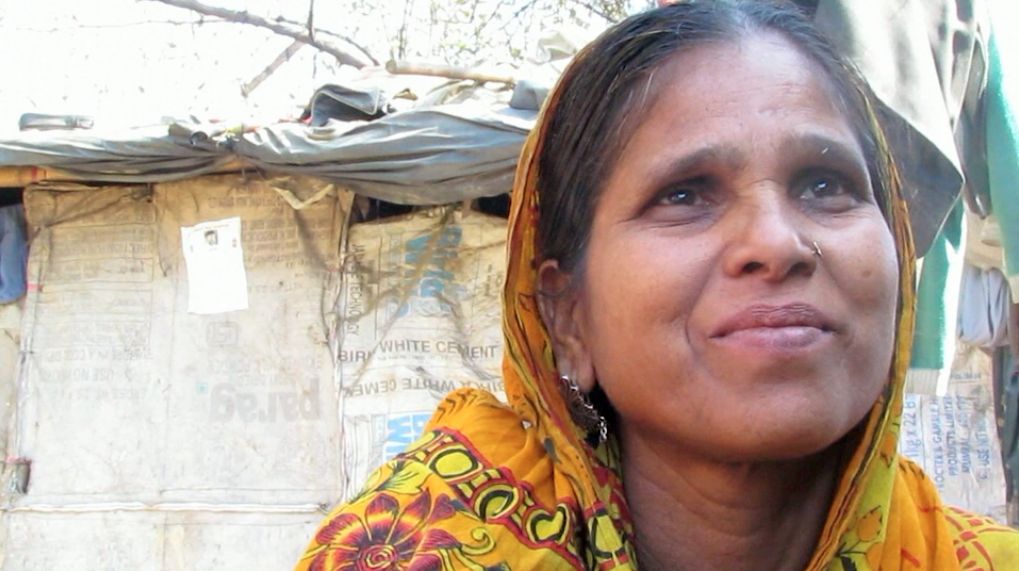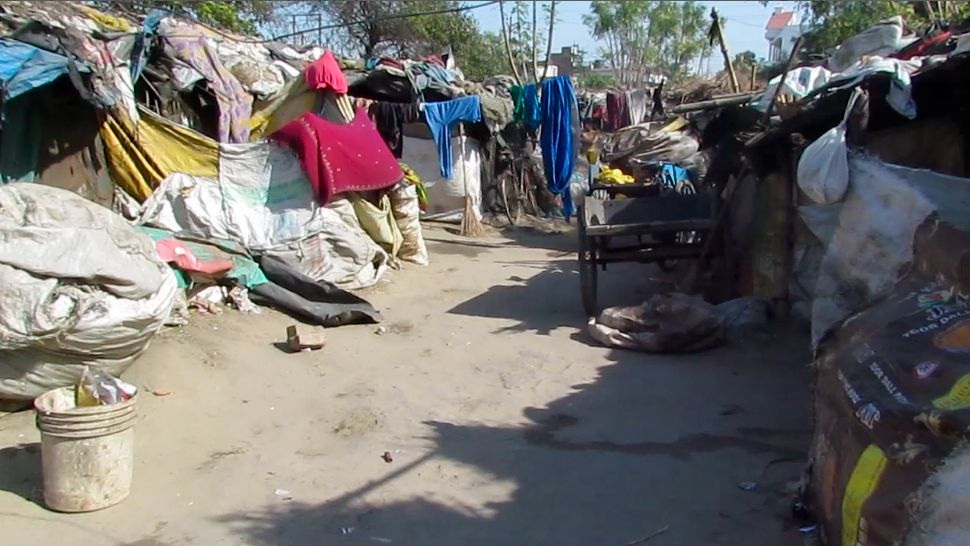This article is the second in a new series that follows the lives of four Assamese Muslim refugees currently living in a slum in the Rahimnagar section of Lucknow, India. Having fled religious persecution, three of the women make their living as domestic workers, and one works as a rag-picker. Vaidehi Joshi originally reported their stories in her short Urdu film entitled “Lucknow’s Refugees.”

When I finally make it through the maze that is the Rahimnagar fruit market, I have a thin plastic bag filled with bananas clutched in my hand, and a thick layer of dust covering the tops of my feet. Vendors call out to me, trying to convince me that they have the sweetest grapes and the ripest oranges. It is Sunday — shopping day — and the crowds are out in full force.
My bananas and I push our way through the hordes of saris and salwars to hail a cycle rickshaw. My rickshaw wallah doesn’t believe me when I tell him to drop me at a petrol pump. Skeptical, he looks at the mostly abandoned plot, wrinkles his eyebrows and asks, “Are you sure this is where you want to go?” When I hand him a few crumpled five-rupee notes, he shrugs and, without asking another question, pedals away.
Standing at the edge of the brick wall surrounding the plot, I see only men around me. They light up cigarettes, fill up the tanks of their two-wheelers, and chew paan, or betel leaf, leaving behind red stains to mark their territory when they hack up spit and hurl it at the ground.
[pullquote]We’ve never met, but she has already made me one of her own. [/pullquote]Suddenly, I hear a faint voice behind the wall. “Didi?” I look back to see Yasmeen, Zaheda’s twelve-year-old daughter, standing behind me. She doesn’t use my name, but rather the term didi, which means big sister. We’ve never met, but she has already made me one of her own.
Yasmeen motions for me to follow her, and we make our way down a wide path pockmarked with trash. At the end of the path under a leafy tree stands Zaheda.
“You’re finally here!” she exclaims, with a huge grin on her face. “Come, let me introduce you.” When she takes the edge of her sari and pulls it towards her forehead to cover her hair, I do the same.
When we turn the corner, I completely forget about the petrol pump. At the entrance of the slum is a makeshift barn. A few feet away are a row of houses of the same material. The smell of cow dung is unmistakable and inescapable. The air is thick with dust particles kicked up by children playing. The mid-afternoon sun glitters on the plastic blue tarp that constitutes the rooftops of most houses.
I follow Zaheda through a network of skinny streets. Residents begin to poke their heads out of the houses. As we walk, the women greet Zaheda while the men gawk at me.
Soon, there is an army of children following a few feet behind us. We arrive at a much wider street, which is one part gathering space with a few plastic lawn chairs, and one part communal washroom with a few men brushing their teeth and shaving while looking into a mirror tacked onto the trunk of a tree.
“Sit, sit,” Zaheda says to me, pointing to one of the lawn chairs. Within seconds, the throng of children has evolved into a crowd. When I set up my camera, the children hop towards me. One after another, they peer into the screen, giggling at the people who sit unaware on the other side of the lens.
An older woman named Shahida appears in the frame, and Zaheda nudges her to sit on the stool that is in front of me. She wears a wrinkled yellow and orange sari, and heavy silver earrings hang on her earlobes.
“She will talk to you,” Zaheda says, squatting down by my side. With one hand on her shoulder, she encourages Shahida saying, “Look into the camera.”
Instead of looking into the camera, Shahida looks at me. Even though Zaheda has explained to her why I’m here and what I’m doing, she still seems a bit suspicious. The language barrier doesn’t help.
But when Shahida’s grown son stands by her side, she begins to relax. Fluent in Urdu, he convinces Shahida to talk to me in her native Assamese and begins to translate. I quickly realize that what I thought to be suspicion was simply hesitation.

Ten years ago, Shahida left behind her husband and five children in Assam and came to Lucknow with her oldest son. Shahida’s husband is older than her and unable to work. Every day, she works in four different houses as a maid to provide for her family back home.
Each month, she earns approximately $5.00 per house.
Shahida speaks fondly of her children, and eagerly tells me about her two sons-in-law. Since she was unable to send all her children to school, Shahida was forced to marry her daughters off at a young age.
Once in awhile, Shahida gets to go home and see her children. However, she has few good memories of Assam. When I ask her about her homeland, she sighs and shakes her head.
“Things in Assam are really bad,” she says. “The Bodo people trouble us a lot. They destroy our homes, steal from us, kill us, burn us alive.” Shahida says this as a matter-of-fact, showing little emotion apart from the occasional glance towards her son, who is nodding his head in agreement.
[pullquote]Violent clashes between the Muslim immigrant population and the Bodo tribespeople have lead to ethnic riots across the region. [/pullquote]Shahida’s story echoes the headlines that have been pouring in from the Northeastern Indian states, where hundreds of different ethnic groups live. Violent clashes between the Muslim immigrant population and the Bodo tribespeople have lead to ethnic riots across the region.
Shahida tells me of people who have lost everything, and have had to leave the State just to stay alive. “They want our land. The Bodos want our land because we’re Muslim,” she says. She explains that more and more people have begun to leave Assam because of the escalading violence.
Her face sinks when she tells me that Assam has changed so much from the days when she was little girl. When I ask Shahida whether she would ever want to return to Assam, she answers me without a second thought: “No, I don’t want to go back. As long as I have a job here, I will stay.”
At Zaheda’s request, Shahida tells me a similar story of employers who have verbally abused her. She tells me about the local Lucknow police who have threatened to throw her out of the slum even though she and her son pay her rent every month for their 15-square-foot house.
But despite these obstacles, Shahida seems to have welcomed her life in Lucknow with open arms. She holds no animosity towards those who have mistreated her, insisting that most people in this city have been kind to her.
As we talk, I still find myself wondering whether life in Lucknow is that much better than life in Assam. Finally, I ask Shahida if she likes living here. He reply is simple, and to the point.
“Yes, I suppose life here is good. At least, it’s good to be able to fill our stomachs.”
Vaidehi Joshi is 23, and lives in Richmond, Virginia. She studied English at Barnard College in New York City and will be joining the movement to end educational inequity as a 2013 Teach for India fellow in Mumbai. You can see more of her work on her website or follow her on Twitter @vaidehijoshi.












